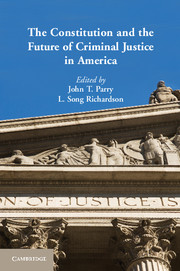Book contents
- Frontmatter
- Contents
- Contributors
- Acknowledgments
- Introduction
- Part I Foundations – The Scope of Criminal Law and Access to Counsel
- 1 The Past and Future of the Right to an Attorney for Poor People Accused of Crimes
- 2 Criminal Justice in America
- Part II Race and Criminal Procedure
- Part III Policing and Privacy
- Part IV Technology and the Surveillance Society
- Part V Confessions and miranda
- Part VI Conviction, Sentencing, and Incarceration
- Part VII Emergencies and Borders – Immigration, Terrorism, National Security, and Transnational Crime
- Index
- References
1 - The Past and Future of the Right to an Attorney for Poor People Accused of Crimes
Published online by Cambridge University Press: 05 June 2014
- Frontmatter
- Contents
- Contributors
- Acknowledgments
- Introduction
- Part I Foundations – The Scope of Criminal Law and Access to Counsel
- 1 The Past and Future of the Right to an Attorney for Poor People Accused of Crimes
- 2 Criminal Justice in America
- Part II Race and Criminal Procedure
- Part III Policing and Privacy
- Part IV Technology and the Surveillance Society
- Part V Confessions and miranda
- Part VI Conviction, Sentencing, and Incarceration
- Part VII Emergencies and Borders – Immigration, Terrorism, National Security, and Transnational Crime
- Index
- References
Summary
The Supreme Court declared more than a half-century ago that “there can be no equal justice where the kind of trial a man gets depends on the amount of money he has.” The Court later recognized that representation by lawyers is “fundamental and essential” for fairness in criminal cases. It required that lawyers be provided to people accused of crimes who could not afford them in all cases where there is a possible loss of liberty.
The legal system is so complex and contains so many procedural traps that a layperson accused of a crime can no more navigate it alone than a passenger can fly a plane in the absence of the pilot. Those accused of crimes rely upon lawyers to protect all of their legal rights, investigate thoroughly the facts, test the prosecution’s case against them through cross-examination of witnesses and other means, produce evidence that casts doubt upon guilt, and, for those found guilty, present information about the client and argue for a sentence that takes into consideration the individual circumstances of the client. This is fundamental to a fair, legitimate, and credible criminal justice system that produces reliable verdicts.
- Type
- Chapter
- Information
- Publisher: Cambridge University PressPrint publication year: 2013

